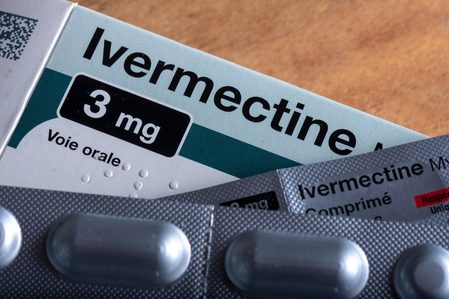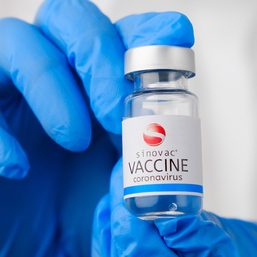SUMMARY
This is AI generated summarization, which may have errors. For context, always refer to the full article.
![[OPINION] On Ivermectin, COVID-19 response, and the business sector](https://www.rappler.com/tachyon/2021/05/tl-sq-1.jpg)
The systematic shortcomings of the national strategy for the pandemic have pushed the business community to experimental interventions that lack oversight and safety mechanisms. This move may be a desperate response to fear, confusion, and governmental failures in the fight against COVID-19.
Business sector leaders have pushed for the approval of the use of ivermectin, an anti-parasitic agent, on an off-label basis, based only on anecdotal evidence and systematic reviews released by a number of groups, in-country and internationally. They have used the examples of Latin America and Africa as proof that the drug can be used for a low-and-middle-income country like the Philippines.
Although there may be a country correlation, there may be many other reasons for this observation. For a government policy on using ivermectin as treatment or prophylaxis, correlation may not be enough. We need better studies on which to base decisions that will affect the whole population.
The business leaders using ivermectin have championed the drug based on their personal experience or their family or friends’ experiences. The scientific community takes note of these as anecdotal reports needing further examples, based on the hierarchy of evidence. Anecdotal evidence or case studies are the second to the lowest in value after laboratory or animal studies.
Business leaders and other users of case reports are also prone to selection bias. This means that they may have only been looking at reports on those who have gotten better with the drug, discounting evidence of those who may have gotten worse. There is also a range of other biases that need to be considered when reading these reports. Are these people living in similar conditions? Do they have comparable states of health?
This is the point of doing clinical trials. These clinical trials, especially those that are randomized, remove these other factors, or what are called confounding variables. And when all these good clinical trials are aggregated into a meta-analysis or systematic review, then it provides a basis for sound decision-making. However, if the studies are poor and biases are not addressed, decisions are bound to be the same.
At present, medical societies such as the Philippine Society of Public Health Physicians, the Philippine Society for Microbiology and Infectious Diseases, and the Philippine Medical Association have not recommended the use of ivermectin for the treatment and prevention of COVID-19. This is based on their assessment that there is still low quality of evidence. These guidelines can change as the evidence changes and more clinical trials are done and evaluated.
Currently, the Philippines is doing a clinical trial on ivermectin, funded by the Philippine Council for Health Research and Development (PCHRD). However, this will still take time to conclude. The efforts of the business community could have been better used for supporting this clinical trial.
The Department of Science and Technology and PCHRD have been doing their part. Great investments and research agenda-setting activities have been implemented the past years. Yet, the country would be in a better position if we invested more on science and health for all.
We are in a situation where we cannot produce quality evidence because we lack the ecosystem for innovation and evaluation. With better research capacity and a proactive engagement with the private sector, the speed of generating evidence and products could be at par with our neighbors. The whole of government could have made research and development more of a priority the past years. However, through the years we have seen politicians belittling our scientists doing research.
Countries that have focused on universal health care, research and development, and evidence-based decision-making at the highest level have harvested the fruits of their labor during this COVID-19 pandemic. To name a few, these are Vietnam, Thailand, and Taiwan. These are our neighbors and peers in Southeast Asia. We cannot make the excuse that others are faring better because they are richer. They are doing better because they have made better decisions through the years, and now they are enjoying their thriving economies.
We can only learn from our past mistakes. Investments in science and health in all levels and sectors need to be better. Way better. Hopefully, through this, the country can put more trust in our scientists, researchers, health professionals, and institutions. We have to incentivize our scientists to stay and for our healthcare workers to thrive, not push them into false servitude. We have to overhaul our primary health care services, making personalized care for everyone possible. But those are long term solutions.
For the short term, we should focus on the basics. Remove the hurdles to testing and have humane and comfortable isolation centers. Have basic evidence-based health care available to those with mild symptoms as well as appropriate care for those with severe infections regardless of the ability to pay. And lastly, get the best vaccines available. We need everyone to get vaccinated by removing the hurdles for access to everyone. Go door to door if you have to.
These are the efforts that the business sector should focus their support on right now. And in the long run, they are expected to be partners of the country for increased investment in research and development. – Rappler.com
These are recommendations of Dr. Miguel Salazar, a member of the Philippine Society of Public Health Physicians Technical Committee, based on evidence, current policy, and experience. The article has been reviewed by Michael Caampued, MD, MPM, MPH, and Lester Geroy, MD, MPH, MSc of the PSPHP Technical Committee.
Voices features opinions from readers of all backgrounds, persuasions, and ages; analyses from advocacy leaders and subject matter experts; and reflections and editorials from Rappler staff.
You may submit pieces for review to opinion@rappler.com.
Add a comment
How does this make you feel?




![[Tycoon Tales] The Gothong clan](https://www.rappler.com/tachyon/2024/02/PanglaoBay1_-CarlosAGothongLinesInc.jpg?resize=257%2C257&crop=288px%2C0px%2C792px%2C792px)



![[Rappler’s Best] US does propaganda? Of course.](https://www.rappler.com/tachyon/2024/06/US-does-propaganda-Of-course-june-17-2024.jpg?resize=257%2C257&crop=236px%2C0px%2C720px%2C720px)



There are no comments yet. Add your comment to start the conversation.